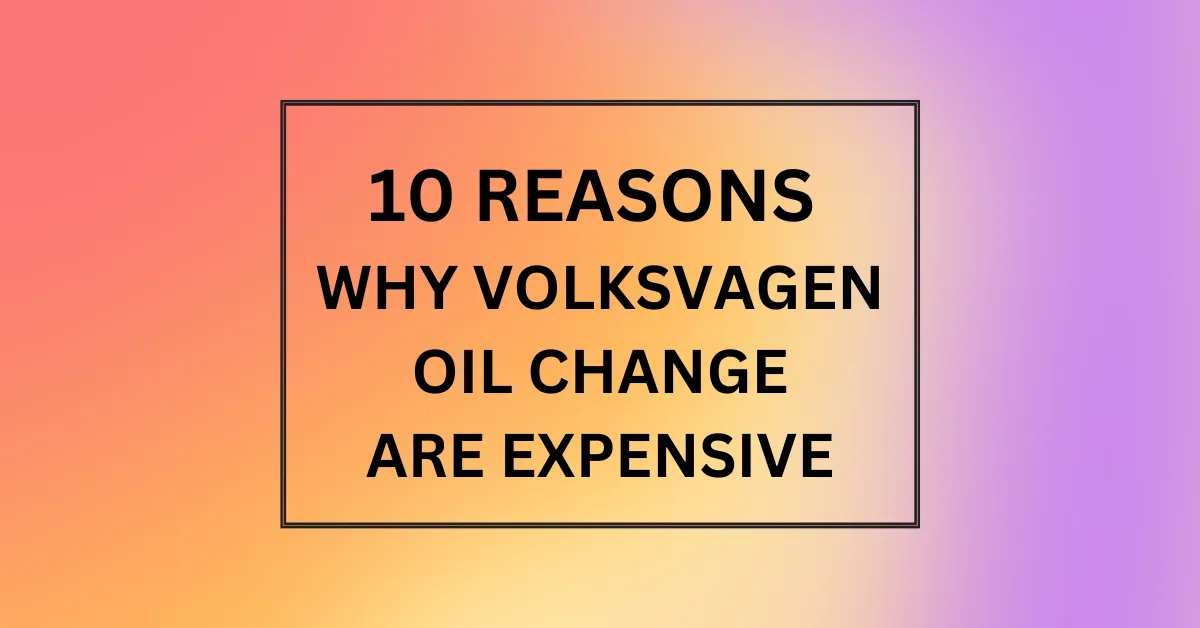Volkswagen oil changes are expensive because VWs require specialized oils and parts not used in many other vehicles, driving up costs. Also, VW engines have shorter intervals between changes, use more expensive synthetic oil, and computer systems actively monitor oil life, erring toward more frequent servicing. Finally, complex VW engine designs call for precision servicing using strict oil specifications, adding more intricate labor and pricier fluids.
If you’ve ever taken your Volkswagen in for an oil change, you’ve probably walked away with a bit less money in your wallet and wondered why something so routine costs so much. Well, as it turns out there are a few reasons that contribute to VW oil changes hitting the wallet harder than other makes.
Top 10 Reasons Why Are Volkswagen Oil Changes So Expensive
1. Specialty Oil Filter
Most VWs use a specialized oil filter cartridge instead of the typical spin-on filter you see in most cars. This cartridge houses the filter element and other components in a single sealed unit, made specifically by Volkswagen. Since it’s a VW specialty part not used in many other vehicles, the price gets jacked up.
2. Full Synthetic Oil Only
For nearly all current VW engine applications, the automaker requires full synthetic oil. Synthetic oils cost considerably more than conventional oils, running around $7-9 per quart typically while conventional may run $3-5 per quart. With VWs requiring 5-6 quarts typically, that’s a decent chunk of the higher service cost right there.
3. Intensive Engine Design
Several high-performance VW engines like the 2.0T in the GTI have very intricate designs, with components needing very precise tolerances and specifications on things like oil viscosity.
This precision means you can’t skimp on cheap fluids or filters without risking long-term reliability or performance. It also restricts oil change intervals in some cases. More frequent, fussier oil changes drives costs up.
4. Dealer Labor Rates
Like most German luxury brands, Volkswagen dealership labor rates are generally higher than average non-luxury brand service departments. With hourly shop charges averaging $125-150+ in some areas, basic services take a bigger chunk of time and money. Oil changes require calibration of systems like oil change indicators and involve more precision in general.
5. Interval Monitoring
Newer VW engine computer systems actually monitor oil life based on driving conditions, meaning they may adjust recommendations to shorter intervals than the traditional “every 5,000 miles” based on detected conditions.
This means you are dictated more by the car’s monitoring system, which errs toward the aggressive side to prevent issues arising from oil breakdown before the next change. With computers calling more of the shots, you may be doing oil changes more frequently than expected.
6. Capacity For Premium Oils
With very performance-oriented powertrains sporting technologies like turbocharging, Volkswagen engines are designed and calibrated around the use of advanced full synthetic formulas.
For owners wanting maximum power delivery and fuel efficiency from engines like the Golf R’s turbocharged 2.0L 4-cylinder, using premium synthetics is vital. These oils carry premium pricing, further adding to costs.
7. Quirky Drain Plugs
On some Volkswagen models, the engine oil drain plug location and arrangement is unusually complex: requiring special tools or procedures and extra time/care in accessing them. These quirks add frustrating labor time for technicians, and that hourly shop rate keeps climbing as they carefully access tough-to-reach drain plugs.
8. Ancillary System Requirements
Some VW oil change procedures may require adding or replacing other fluids at prescribed intervals or mileage marks – items like transmission fluid, coolant, brake fluid or others.
Most manufacturer recommendations call for periodically replacing these, independent of oil life, meaning your bill tallies up with more than just labor and oil filter/fluid capacity. You may need new engine air filters or fuel filters too.
9. Rigid Oil Specifications
VW maintains very stringent standards on oil specifications – oils have to meet exacting standards to be certified for use in that model year engine. Factors like viscosity, additives, synthetic content and viscosity index are tightly controlled.
What this means is that shops can’t grab just any bottle of synthetic off the shelf – they need VW-certified, exact-match formulas.
These are pricier than typical oils. Using incorrect, non-VW certified formulas risks major issues down the line – sludge buildup, poor engine protection, clogged parts and more. So the approved stuff is non-negotiable.
10. High Service Frequency
Many VW engines have shorter oil change intervals than comparable models from other brands – some have 5,000 mile windows while competitors call for 7,500 or even 10,000 between changes. More frequent servicing equals more money over time.
Some models increase frequency further through computer monitoring of conditions and driving style. If you log mostly city stops-and-starts for example, the engine works harder and intervals get shortened by the VW monitoring systems. More oil changes = less cash in your pocket.
FAQS.
Are Volkswagen oil changes Good?
Yes, Volkswagen oil changes are good – they use top quality synthetic oils and OEM filters, with service procedures designed specifically for that VW engine to give precision lubrication and prevent premature wear. They protect your investment.
Are Volkswagen oil changes Worth The Price?
The higher price of Volkswagen oil changes versus other vehicles does buy you the specialized fluids, parts longevity and manufacturing prescribed service your complex VW engine requires, so the cost is justified to protect reliability.
Where To Buy Volkswagen oil changes?
You can purchase Volkswagen oil changes at your local VW dealership; they use certified technicians and OEM parts that meet strict specifications. You can also visit reputable independent shops that work on European vehicles specifically.

